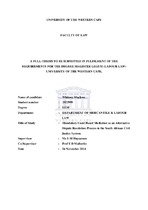| dc.description.abstract | Civil litigation is the primary method of dispute resolution in the South African civil justice system. This process is characterised by a number of shortcomings which include the adversarial nature of the process which often creates further conflict between disputing parties and often results in permanently destroyed relationships between them. Further shortcomings include the highly complex, costly and time-consuming nature of civil litigation. These shortcomings infringe on the constitutional imperative of access to justice for South Africans, particularly for the indigent members of society. In addition, court rolls have become overburdened due to the rapidly increasing volume of litigation at court. This often results in extensive waiting periods before matters are heard at court and further infringes the attainment of access to justice. While progress has been made in enhancing the civil justice system over the years, the aforementioned shortcomings prevail. In recent years the South African government has introduced the concept of mandatory court based mediation to the civil justice system with the view of promoting access to justice and enhancing the civil justice system. In a nutshell, mandatory court based mediation refers a civil dispute to mediation once an appearance to defend is entered at court, in order to attempt the settlement of the matter. In the event of the dispute not being resolved, the matter is then referred back to the conventional litigation process for resolution. Mandatory court based mediation, while controversial and bearing valid criticism; aims to promote access to justice and reconciliation between aggrieved parties and remedies a number of the shortcomings currently plaguing the South African civil justice system. In answering the research question of whether this ADR process is suitable to implement in South Africa in order to remedy the shortcomings of its civil justice system, the following aspects are considered in this thesis: the benefits, advantages, and the constitutionality of mandatory court based mediation, as well as the criticisms and challenges of the process. South Africa may have an adversarial civil justice system, but is no stranger to the practice of mediation. Within South African civil law a number of fields have mentioned mediation as
the preferred method of dispute resolution over years. These areas of law will be highlighted in this thesis. Internationally, the jurisdiction of the Australian states of New South Wales and Victoria will also be highlighted. This analysis is done in order to assess the implementation and function of a mediation system, as a preferred method of dispute resolution, across all areas of civil law within an adversarial civil justice system. The current civil justice system in South Africa needs to be remedied due to its negative impact on civil disputants and the nation of South Africa in a broader sense. This thesis does not suggest that mandatory court based mediation is a panacea for all ills plaguing the country’s civil justice system. However, this ADR process may suit South Africa and its implementation may make a considerable remedial contribution and possibly significantly enhance its civil justice system. | en_US |

